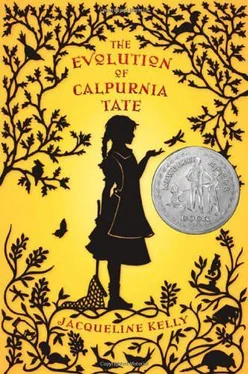Jacqueline Kelly - The Evolution of Calpurnia Tate
Здесь есть возможность читать онлайн «Jacqueline Kelly - The Evolution of Calpurnia Tate» весь текст электронной книги совершенно бесплатно (целиком полную версию без сокращений). В некоторых случаях можно слушать аудио, скачать через торрент в формате fb2 и присутствует краткое содержание. Город: New York, Год выпуска: 2009, ISBN: 2009, Издательство: Macmillan : Henry Holt and Company, Жанр: Детская проза, на английском языке. Описание произведения, (предисловие) а так же отзывы посетителей доступны на портале библиотеки ЛибКат.
- Название:The Evolution of Calpurnia Tate
- Автор:
- Издательство:Macmillan : Henry Holt and Company
- Жанр:
- Год:2009
- Город:New York
- ISBN:978-0-8050-8841-0
- Рейтинг книги:5 / 5. Голосов: 1
-
Избранное:Добавить в избранное
- Отзывы:
-
Ваша оценка:
- 100
- 1
- 2
- 3
- 4
- 5
The Evolution of Calpurnia Tate: краткое содержание, описание и аннотация
Предлагаем к чтению аннотацию, описание, краткое содержание или предисловие (зависит от того, что написал сам автор книги «The Evolution of Calpurnia Tate»). Если вы не нашли необходимую информацию о книге — напишите в комментариях, мы постараемся отыскать её.
The Evolution of Calpurnia Tate — читать онлайн бесплатно полную книгу (весь текст) целиком
Ниже представлен текст книги, разбитый по страницам. Система сохранения места последней прочитанной страницы, позволяет с удобством читать онлайн бесплатно книгу «The Evolution of Calpurnia Tate», без необходимости каждый раз заново искать на чём Вы остановились. Поставьте закладку, и сможете в любой момент перейти на страницу, на которой закончили чтение.
Интервал:
Закладка:
Father, on learning that we would miss our lessons, said, “A good thing, too. A boy needs piano like a snake needs a hoopskirt.”
Mother didn’t want to hear it. She wanted seventeen-year-old Harry, her oldest, to become a gentleman. She had plans to send him off to the university in Austin fifty miles away when he turned eighteen. According to the newspaper, there were five hundred students at the university, seventeen of them well-chaperoned young ladies in the School of Liberal Arts (with a choice of music, English, or Latin). Father’s plan was different; he wanted Harry to be a businessman and one day take over the cotton gin and the pecan orchards and join the Freemasons, as he had. Father apparently didn’t think piano lessons were a bad idea for me though, if he considered the matter at all.
In late June, the Fentress Indicator reported that the temperature was 106 degrees in the middle of the street outside the newspaper office. The paper did not mention the temperature in the shade. I wondered why not, as no one in his right mind spent more than a second in the sun, except to make smartly for the next patch of shadow, whether it be cast by tree or barn or plow horse. It seemed to me that the temperature in the shade would be a lot more useful to the citizens of our town. I labored over A Letter To The Editor pointing this out, and to my great amazement, the paper published my letter the following week. To my family’s greater amazement, it began to publish the temperature in the shade as well. Reading that it was only 98 in the shade somehow made us all feel a bit cooler.
There was a sudden surge in insect activity both inside the house and out. Grasshoppers rose in flocks beneath the horses’ hooves. The fireflies came out in such great numbers that no one could remember a summer with a more spectacular show. Every evening, my brothers and I gathered on the front porch and held a contest to see who could spot the first flicker. There was considerable excitement and honor in winning, especially after Mother took a scrap of blue silk from her sewing basket and cut out a fine medallion, complete with long streamers. In between headaches she embroidered FENTRESS FIREFLY PRIZE on it in gold floss. It was an elegant and much-coveted prize. The winner kept it until the following night.
Ants invaded the kitchen as never before. They marched in military formation through minute cracks around the baseboards and windows and headed straight for the sink. They were desperate for water and would not be stopped. Viola took up arms against them to no avail. We deemed the fireflies a bounty and the ants a plague, but it occurred to me for the first time to question why there should be such a distinction. They were all just creatures trying to survive the drought, as we were. I thought Viola should give up and leave them alone, but I reconsidered after discovering that the black pepper in the egg salad was not pepper at all.
While certain insects overran us, some of the other normal inhabitants of our property, such as earthworms, disappeared. My brothers complained about the lack of worms for fishing and the difficulty of digging for them in the hard, parched ground. Perhaps you’ve wondered, Can earthworms be trained? I’m here to tell you that they can. The solution seemed obvious to me: The worms always came when it rained, and it was easy enough to make some rain for them. I carried a tin bucket of water to a shaded area in the five acres of scrub and dumped it on the ground in the same place a couple of times a day. After four days, I only had to show up with my bucket, and the worms, drawn by my footsteps and the promise of water, crawled to the surface. I scooped them up and sold them to Lamar for a penny a dozen. Lamar nagged me to tell him where I’d found them, but I wouldn’t. However, I did confess my method to Harry, my favorite, from whom I could keep nothing. (Well, almost nothing.)
“Callie Vee,” he said, “I’ve got something for you.” He went to his bureau and took out a pocket-sized red leather notebook with SOUVENIR OF AUSTIN stamped on the front.
“Look here,” he said. “I’ve never used it. You can use it to write down your scientific observations. You’re a regular naturalist in the making.”
What, exactly, was a naturalist? I wasn’t sure, but I decided to spend the rest of my summer being one. If all it meant was writing about what you saw around you, I could do that. Besides, now that I had my own place to write things down, I saw things I’d never noticed before.
My first recorded notes were of the dogs. Due to the heat, they lay so still in the dirt as to look dead. Even when my younger brothers chivvied them with sticks out of boredom, they wouldn’t bother to raise their heads. They got up long enough to slurp at the water trough and then flopped down again, raising puffs of dust in their shallow hollows. You couldn’t have rousted Ajax, Father’s prize bird dog, with a shotgun let off a foot in front of his muzzle. He lay with his mouth lolling open and let me count his teeth. In this way, I discovered that the roof of a dog’s mouth is deeply ridged in a backwards direction down his gullet, in order no doubt to encourage the passage of struggling prey in one direction only, namely that of DINNER. I wrote this in my Notebook.
I observed that the expressions of a dog’s face are mainly manifested by the movement of its eyebrows. I wrote, Why do dogs have eyebrows? Why do dogs need eyebrows?
I asked Harry, but he didn’t know. He said, “Go ask Grandfather. He knows that sort of thing.”
But I wouldn’t. The old man had fierce tufty eyebrows of his own, rather like a dragon’s, and he was altogether too imposing a figure for me to have clambered on as an infant. He had never spoken to me directly that I remembered, and I wasn’t entirely convinced he knew my name.
Next I turned my attention to the birds. For some reason, we had a great number of cardinals about the place that year. Harry tickled me when he said we had a fine crop of them, as if we had something to do with their number, as if we had labored to harvest their bright, cheerful bodies and place them in the trees along our gravel drive like Christmas ornaments. But because there were so many and the drought had cut down on their normal diet of seeds and berries, the males squabbled furiously over possession of each hackberry tree. I found a mutilated dead male in the brush, a startling and sad sight. Then one morning a female came to perch on the back of the wicker chair next to me on the porch. I froze. I could have reached out and touched her with my finger. A lump of gray-brown matter dangled from her pale-apricot beak. It looked like a tiny baby mouse, thimble-sized, dead or dying.
When I related this at dinner, Father said, “Calpurnia, cardinals do not eat mice. They live on vegetation. Sam Houston, please pass the potatoes.”
“Yes, well, I’m just telling you, sir,” I said lamely, and then felt furious with myself for not having defended what I’d seen with my own eyes. The thought of the cardinals driven to such unnatural behavior repelled me. The next step would be cannibalism. Before I went to bed that night, I took a can full of oats from the stable and dribbled them along the drive. I wrote in the Notebook, How many cardinals will we have next year, with not enough to eat? Remember to count.
I next wrote in my Notebook that we had two very different kinds of grasshoppers that summer. We had the usual quick little emerald ones decorated all over with black speckles. And then there were huge bright yellow ones, twice as big, and torpid, so waxy and fat that they bowed down the grasses when they landed. I had never seen these before. I polled everyone in the house (except Grandfather) to find out where these odd yellow specimens had come from, but nobody could tell me. None of them was the slightest bit interested.
Читать дальшеИнтервал:
Закладка:
Похожие книги на «The Evolution of Calpurnia Tate»
Представляем Вашему вниманию похожие книги на «The Evolution of Calpurnia Tate» списком для выбора. Мы отобрали схожую по названию и смыслу литературу в надежде предоставить читателям больше вариантов отыскать новые, интересные, ещё непрочитанные произведения.
Обсуждение, отзывы о книге «The Evolution of Calpurnia Tate» и просто собственные мнения читателей. Оставьте ваши комментарии, напишите, что Вы думаете о произведении, его смысле или главных героях. Укажите что конкретно понравилось, а что нет, и почему Вы так считаете.












